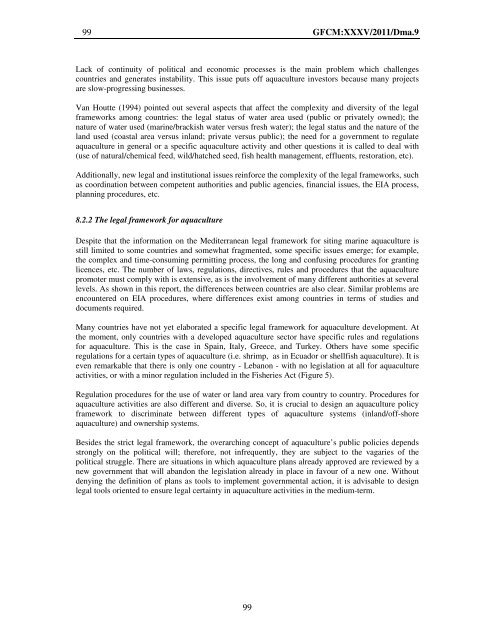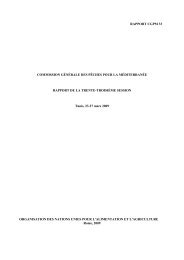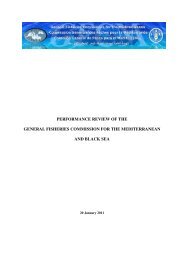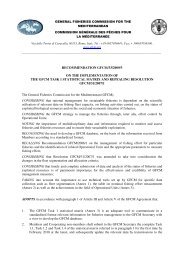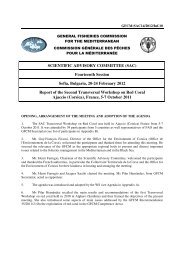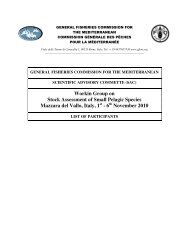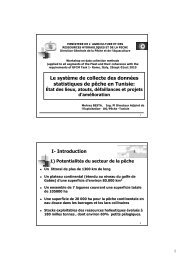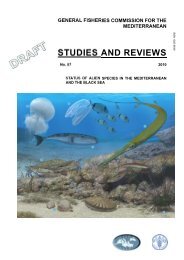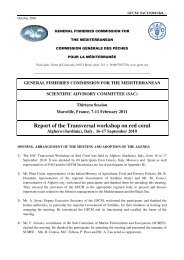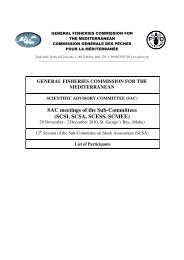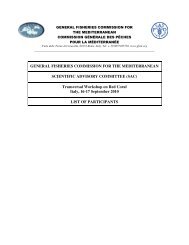Site selection and carrying capacity in Mediterranean ... - FAO Sipam
Site selection and carrying capacity in Mediterranean ... - FAO Sipam
Site selection and carrying capacity in Mediterranean ... - FAO Sipam
Create successful ePaper yourself
Turn your PDF publications into a flip-book with our unique Google optimized e-Paper software.
99 GFCM:XXXV/2011/Dma.9<br />
Lack of cont<strong>in</strong>uity of political <strong>and</strong> economic processes is the ma<strong>in</strong> problem which challenges<br />
countries <strong>and</strong> generates <strong>in</strong>stability. This issue puts off aquaculture <strong>in</strong>vestors because many projects<br />
are slow-progress<strong>in</strong>g bus<strong>in</strong>esses.<br />
Van Houtte (1994) po<strong>in</strong>ted out several aspects that affect the complexity <strong>and</strong> diversity of the legal<br />
frameworks among countries: the legal status of water area used (public or privately owned); the<br />
nature of water used (mar<strong>in</strong>e/brackish water versus fresh water); the legal status <strong>and</strong> the nature of the<br />
l<strong>and</strong> used (coastal area versus <strong>in</strong>l<strong>and</strong>; private versus public); the need for a government to regulate<br />
aquaculture <strong>in</strong> general or a specific aquaculture activity <strong>and</strong> other questions it is called to deal with<br />
(use of natural/chemical feed, wild/hatched seed, fish health management, effluents, restoration, etc).<br />
Additionally, new legal <strong>and</strong> <strong>in</strong>stitutional issues re<strong>in</strong>force the complexity of the legal frameworks, such<br />
as coord<strong>in</strong>ation between competent authorities <strong>and</strong> public agencies, f<strong>in</strong>ancial issues, the EIA process,<br />
plann<strong>in</strong>g procedures, etc.<br />
8.2.2 The legal framework for aquaculture<br />
Despite that the <strong>in</strong>formation on the <strong>Mediterranean</strong> legal framework for sit<strong>in</strong>g mar<strong>in</strong>e aquaculture is<br />
still limited to some countries <strong>and</strong> somewhat fragmented, some specific issues emerge; for example,<br />
the complex <strong>and</strong> time-consum<strong>in</strong>g permitt<strong>in</strong>g process, the long <strong>and</strong> confus<strong>in</strong>g procedures for grant<strong>in</strong>g<br />
licences, etc. The number of laws, regulations, directives, rules <strong>and</strong> procedures that the aquaculture<br />
promoter must comply with is extensive, as is the <strong>in</strong>volvement of many different authorities at several<br />
levels. As shown <strong>in</strong> this report, the differences between countries are also clear. Similar problems are<br />
encountered on EIA procedures, where differences exist among countries <strong>in</strong> terms of studies <strong>and</strong><br />
documents required.<br />
Many countries have not yet elaborated a specific legal framework for aquaculture development. At<br />
the moment, only countries with a developed aquaculture sector have specific rules <strong>and</strong> regulations<br />
for aquaculture. This is the case <strong>in</strong> Spa<strong>in</strong>, Italy, Greece, <strong>and</strong> Turkey. Others have some specific<br />
regulations for a certa<strong>in</strong> types of aquaculture (i.e. shrimp, as <strong>in</strong> Ecuador or shellfish aquaculture). It is<br />
even remarkable that there is only one country - Lebanon - with no legislation at all for aquaculture<br />
activities, or with a m<strong>in</strong>or regulation <strong>in</strong>cluded <strong>in</strong> the Fisheries Act (Figure 5).<br />
Regulation procedures for the use of water or l<strong>and</strong> area vary from country to country. Procedures for<br />
aquaculture activities are also different <strong>and</strong> diverse. So, it is crucial to design an aquaculture policy<br />
framework to discrim<strong>in</strong>ate between different types of aquaculture systems (<strong>in</strong>l<strong>and</strong>/off-shore<br />
aquaculture) <strong>and</strong> ownership systems.<br />
Besides the strict legal framework, the overarch<strong>in</strong>g concept of aquaculture’s public policies depends<br />
strongly on the political will; therefore, not <strong>in</strong>frequently, they are subject to the vagaries of the<br />
political struggle. There are situations <strong>in</strong> which aquaculture plans already approved are reviewed by a<br />
new government that will ab<strong>and</strong>on the legislation already <strong>in</strong> place <strong>in</strong> favour of a new one. Without<br />
deny<strong>in</strong>g the def<strong>in</strong>ition of plans as tools to implement governmental action, it is advisable to design<br />
legal tools oriented to ensure legal certa<strong>in</strong>ty <strong>in</strong> aquaculture activities <strong>in</strong> the medium-term.<br />
99


